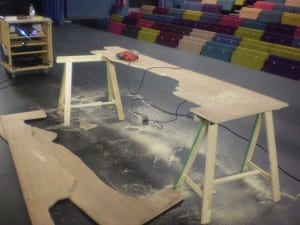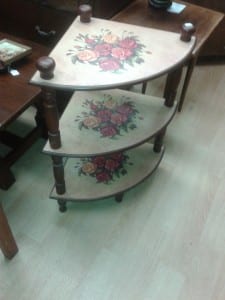As stated in a previous post, a stage manager must be hard-working, dedicated and at the same time sympathetic and kind. Within this post I will discuss the way in which my role of stage manager adapted and grew during the process of this module.
Peter Maccoy states in Essentials of Stage Management that ‘A Group of people is like a living organism, adapting and evolving until it can function at its optimum potential’ (2004, p. 26). Maccoy goes on to explain that these groups of people undergo a series of phases before they reach this goal (2004, p. 27). These stages are split into four categories, forming, storming, norming and performing.
During the first session of the module, we decided the groups we would be in as theatre companies. Each individual was asked to describe their strengths and weaknesses within the theatre world in order to assign roles to each member of the company. When listening to others comments and sharing each others experiences, straight the way we could see ourselves forming into a theatre company. Some of us had previous experience at either work or other education before university in such things as business and marketing. This allowed members of the company to combine their knowledge from not only the university course but other skills learnt and utilise them within the theatre company. As I have had previous experience with Stage Management, I put myself forward to be the stage manager for our theatre company.
I knew from the very beginning that the role of stage manager would be a hard and challenging task, however with the experience I gained from other productions, I was confident that I could apply the relevant skills for the task. As Peter Maccoy goes on to state that a ‘stage manager must keep an open mind and should never try to take sides’ during the forming stage (2004, p. 27). By taking this quote and utilising it, I enabled myself to take each individuals personalities and roles within the company on board, using each of their skills to benefit the production as a whole.
As stated in the previous post, a stage manager must be prepared to empathise and encourage each member of the company. In particular, when decisions were made within the ‘forming’ stage, I tried to ensure that each voice was heard, giving individuals the time to express their views and making sure each view was recognised. If any problems occurred during these early stages of production, I made sure that these problems or questions were resolved before continuing with the development of the performance. An example of this would be when the company as a whole decided to use Angela Carter’s The Bloody Chamber as the starting point for our script writing. Some of the members of the company were concerned with the use of graphic sexual content within the story, worrying that something like this would deter our audiences from watching the show. By bringing this issue up in one of our early meetings, these concerns were quickly erased by the script writers explaining that the use of sexual content within our play would be minimal and tasteful. This allowed the company to come to an agreement upon the direction of the performance, whilst keeping each member of the company happy. This moment within the group may be categorised as Peter Maccoy’s ‘storming’ stage, whereby conflicts occur within the group and boundaries are pushed. The previous relationships that are created during the ‘forming’ stage may be broken down and challenged. This process occurs within theatre companies and disagreements are inevitable. It is therefore up to the stage manager to outline any issues that may arise and keep each member of the company in the loop of the progress of production.
During the ‘storming’ stage, Maccoy also expresses the importance of including the director and providing them with comfort. It may sometimes seem that the actors are ‘taking it out’ on the director because of their particular characters traits. It is at this point where the stage manager should be there to offer support to not only the director, but the actors who may be feeling neglected by the director. Within this particular theatre company, a rehearsal had ended and the director became upset. I spent a short time with her explaining that she was not to blame but that each actor was individually becoming stressed with the work-load. At this point I knew I should offer a shoulder to lean on as each member of the company began to give up hope on the production. After talking with the actors and director, I believe this moment of ‘storming’ made the company stronger as a whole, knowing that each individual could share their opinions and move forward in the right direction.
After this particular rehearsal, things seemed to progress rapidly, as Maccoy describes the ‘norming’ stage whereby all members of the company begin to look at the bigger picture (2004, p.29). As our rehearsals started to become more frequent, it was obvious that we needed a larger space to rehearse in. I made contact with Lincoln City Football Club, asking if they would donate one of their large function rooms for us to rehearse in. As they agreed it became apparent that each member of the company was willing to participate in helping move chairs, tables and bringing set to the room in order for us to rehearse. Over the three days we were granted this rehearsal space, each member of the company made full use of the time and space, ensuring that the donated space was not wasted. This conveyed to both myself and the supervisor at Lincoln City Football Club that Progeny Theatre Company were a team of young individuals, striving for the same goal and working together to reach it.
The final stage within a theatre company as Maccoy describes is ‘performing’. At this point the actors know their roles and lines, so ‘can begin to spark off one another’ (2004 p. 29). This point within the process occurs towards the end of the rehearsal process after the first couple of full runs of the performance. Members of the company can now look at the production as a whole and begin to develop their characters deeper. This also allows the director to begin to concentrate on the over all image of the piece, stating for instance how they would like their lighting and set to look. It is the responsibility of the stage manager to take this visions and create them within the theatre. As expected, some of the directors ‘dreams’ may not be able to come to reality however, the stage manager must attempt to create these ‘dreams’ as best they can. During this stage I scheduled a meeting with the director to discuss each scene and the images that emerged from them. I encouraged her to ‘dream big’ as I wanted her to express her passion towards each scene. In the case that something was not possible, at least I could ensure that the same amount of passion would be expressed by offering an alternative staging idea or lighting state.
By studying these four stages the reasoning behind them became clear to me, each individual has their own concepts and ideas about a production and the way it looks. It is therefore the stage managers responsibility to preconceive these stages and prepare a way in which they can ensure a successful transition from one to the next, resulting in the agreement and satisfaction of each member of the company. A stage manager should always remember that ‘A theatre company is a complex group, or series of groups, of individuals involved in a creative endeavour’ (2004, p. 30).
Word count: 1293
Alex Urbanczyk
Works Cited:
Maccoy, Peter. (2004). Essentials of Stage Management. London: A&C Black Publishers Limited.





